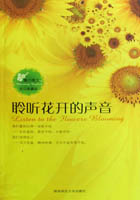
第8章 破茧的蝴蝶 (4)
Seeing this, it caused a great excitement and people wondered what it could be. After about half an hour, a middle-aged man ran there in a hurry and rushed through the crowd to the violinist and grabbed his shoulders and said, “Yes, it’s you. You did come here. I knew that you’re an honest man and would certainly come here.”
The young violinist asked calmly, “Are you Mr. George Sang?”
The man nodded. The violinist asked, “Did you lose something?”
“Lottery. It’s lottery,” said the man.
The violinist took out a lottery ticket on which George Sang’s name was seen. “Is it?” he asked.
George nodded promptly and seized the lottery ticket and kissed it, then he danced with the violinist.
The story turned out to be this: George Sang is an office clerk. He bought a lottery ticket issued by a bank a few days ago. The awards opened yesterday and he won a prize of $500,000. So he felt very happy after work and felt the music was so wonderful, that he took out 50 dollars and put in the hat. However the lottery ticket was also thrown in. The violinist was a student at an Arts College and had planned to attend advanced studies in Vienna. He had booked the ticket and would fly that morning. However when he was cleaning up he found the lottery ticket. Thinking that the owner would return to look for it, he cancelled the flight and came back to where he was given the lottery ticket.
Later someone asked the violinist: “At that time you were in needed to pay the tuition fee and you had to play the violin in the subway station every day to make the money. Then why didn’t you take the lottery ticket for yourself?”
The violinist said, “Although I don’t have much money, I live happily; but if I lose honesty I won’t be happy forever.”
Through our lives, we can gain a lot and lose so much. But being honest should always be with us. If we bear ourselves in a deceptive and dishonest way, we may succeed temporarily. However, from the long-term view, we will be a loser. Such kind of people are just like the water on the mountain. It stands high above the masses at the beginning, but gradually it comes down inch by inch and loses the chance of going up.
在繁华的纽约,曾经发生了这样一件震撼人心的事情。
星期五的傍晚,一个贫穷的年轻艺人仍然像往常一样站在地铁站门口,专心致志地拉着他的小提琴。琴声优美动听,虽然人们都急急忙忙地赶着回家过周末,但还是有很多人情不自禁的放慢了脚步,时不时地会有一些人在年轻艺人跟前的礼帽里放一些钱。
第二天黄昏,年轻的艺人又像往常一样准时来到地铁门口,把他的礼帽摘下来很优雅地放在地上。和以往不同的是,他还从包里拿出一张大纸,然后很认真地铺在地上,四周还用自备的小石块压上。做完这一切以后,他调试好小提琴,又开始了演奏,声音似乎比以前更动听更悠扬。
不久,年轻的小提琴手周围站满了人,人们都被铺在地上的那张大纸上的字吸引了,有的人还踮起脚尖看。上面写着:“昨天傍晚,有一位叫乔治·桑的先生错将一份很重要的东西放在我的礼帽里,请您速来认领。”
见此情景,人群之间引起一阵骚动,都想知道这是一份什么样的东西。过了半小时左右,一位中年男人急急忙忙跑过来,拨开人群就冲到小提琴手面前,抓住他的肩膀语无伦次的说:“啊!是您呀,您真的来了,我就知道您是个诚实的人,您一定会来的。”
年轻的小提琴手冷静地问:“您是乔治·桑先生吗?”
那人连忙点头。小提琴手又问:“您遗落了什么东西吗?”
那位先生说:“奖票,奖票。”
小提琴手于是掏出一张奖票,上面还醒目地写着乔治·桑,小提琴手举着彩票问:“是这个吗?”
乔治·桑迅速地点点头,抢过奖票吻了一下,然后又抱着小提琴手在地上跳起了舞。
原来事情是这样的,乔治·桑是一家公司的小职员,他前些日子买了一张一家银行发行的奖票,昨天上午开奖,他中了50万美元的奖金。昨天下班,他心情很好,觉得音乐也特别美妙,于是就从钱包里掏出50美元,放在了礼帽里,可是不小心把奖票也扔了进去。小提琴手是一名艺术学院的学生,本来打算去维也纳进修,已经定好了机票,时间就在今天上午,可是他昨天整理东西时发现了这张奖票,想到失主会来找,于是今天就退掉了机票,又准时来到这里。
后来,有人问小提琴手:“你当时那么需要一笔学费,为了赚够这笔学费,你不得不每天到地铁站拉提琴。那你为什么不把那50万元的奖票留下呢?”
小提琴手说:“虽然我没钱,但我活得很快乐;假如我没了诚信,我一天也不会快乐。”
在人的一生中,我们会得到许多,也会失去许多,但守信用却应是始终陪伴我们的。如果以虚伪、不诚实的方式为人处世,也许能获得暂时的“成功”,但从长远看,他最终是个失败者。这种人就像山上的水,刚开始的时候,是高高在上,但逐渐逐渐地它就越来越下降,再没有一个上升的机会。
Wounding With Words想知道的话
It’s the one parental motto every kid knows by heart: Just because everybody else is doing it, that doesn’t mean you should, too. From playgrounds to parties, the mantra resonates among tots and teens with each choice they make. But apparently, parents are the ones who need that advice.
When it comes to discipline, too many parents let tempers flare out of control, says a new study by sociologist Murray A. Straus, codirector of the Family Research Lab at the University of New Hampshire. “Parents should never yell, scream, or call their kid [derogatory] names,” he cautions. But nearly all Americans do, no matter their ethnicity, age, or socioeconomic group, the study of 991 parents concludes. Verbal attacks start early on. Half of parents have screamed, yelled, or shouted in rage at their infants. By the time a child reaches 7 years old, 98 percent of parents are verbally lashing out. In some cases, the aggression is startling. One of five parents has threatened to kick a teenage son or daughter out of the house, while a quarter have sworn at their offspring.
The episodes can have serious repercussions, warns Straus, who presented the findings at the American Sociological Association meeting. His earlier work has linked parental verbal aggressiveness with children’s mental illness and, along with a dozen other studies, showed that a parent’s vocal fury can increase the odds of a child’s developing delinquency, depression, and even bulimia.
Several countries have already passed laws banning disciplinary action that inflicts mental suffering on a child, and Straus views them as models to emulate. Sweden was the first to do so, with an official mandate in 1979 that prohibits not only spanking but also any “humiliating treatment” of kids. Swedes publicized the rule on milk cartons, on public TV, and in schools. Many other nations followed suit, including Austria, Denmark, and Israel. And last month, Germany joined the protective ranks, officially assuring children of the right to a nonviolent upbringing without psychological injuries.